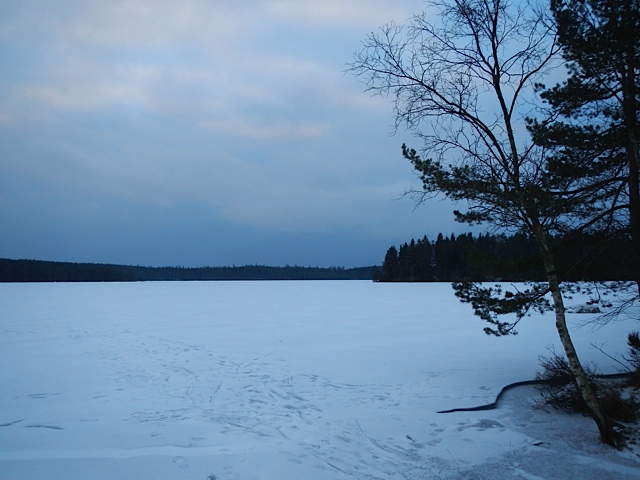
Submitted by: Bodil Frey & Debra Pascali-Bonaro
January 2013 Debra Pascali-Bonaro facilitated a Pleasurable Birth Workshop in Sweden with Bodil Frey, a doula, educator and Gothenburg host, Thea van Tuyl, a doula, educator, and rebozo expert from the Netherlands.
Bodil Frey, workshop host and head of Födelsehuset starts off by sharing with us about birth in Sweden, “Sweden has a good reputation when it comes to birth care and very few babies die around the time of birth. Sweden ranks in the top of that statistic and also has very low numbers of maternal death. The medical system likes to take the credit for this but we also have, of course, a good social security net and Sweden is a wealthy country without major gaps between rich and poor.
 “Some of the good things in Swedish maternity care: the care is free for everyone; in pregnancy you go to prenatal care where you often meet the same midwife every time; you do normally not meet a doctor during this time, except perhaps at the ultrasound scan; first time mothers and their partners can go to a free birth preparation class with a midwife; at birth in the hospital you also meet only midwives if there is no complication or epidural.
“Some of the good things in Swedish maternity care: the care is free for everyone; in pregnancy you go to prenatal care where you often meet the same midwife every time; you do normally not meet a doctor during this time, except perhaps at the ultrasound scan; first time mothers and their partners can go to a free birth preparation class with a midwife; at birth in the hospital you also meet only midwives if there is no complication or epidural.
“Some of the not-so-good things in Swedish maternity care: we lack options; there are no alternatives to hospital birth in most parts of Sweden; in some places there are homebirth midwives, but with some exception we pay privately for their service; planned homebirth is only one per thousand births in Sweden; there are no birth centers; no one can expect to give birth in the hospital with a midwife they know before. (One exception would be the Crown Princess Victoria who gave birth this year with a midwife she had met before!). Even though the midwives handle normal births, the system is getting more and more medicalized. Ceasareans are 17% and steadily rising. And the fears around birth increase- both for the women and for the medical staff.”
The association Bodil founded is Födelsehuset, a cozy home with a kitchen, office and two rooms for us to create a red tent of sharing over a two-day weekend. January in Sweden is cold, a layers of fresh white snow gives light and brightens the cold, gray days, which have more darkness then light this time of year. The warmth inside this space, generated by the pellet stove, feels so good and soon the warmth and light in each of us opens up and shines throughout the room.
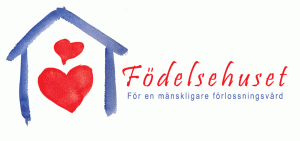 Födelsehuset was founded in 2007 in Gothenburg. Bodil writes, “The name means ”The Birth House” and is a vision of one house– help and support around the woman and baby. Instead of a conveyor belt passing through different institutions and always new faces. We were inspired of the ”Geburtshaus” in Germany. Födelsehuset was founded by parents, doulas and midwifes who wanted to speak up for a better birth care and more options. The logo shows how the newborn heart and the mother heart are protected by the house.
Födelsehuset was founded in 2007 in Gothenburg. Bodil writes, “The name means ”The Birth House” and is a vision of one house– help and support around the woman and baby. Instead of a conveyor belt passing through different institutions and always new faces. We were inspired of the ”Geburtshaus” in Germany. Födelsehuset was founded by parents, doulas and midwifes who wanted to speak up for a better birth care and more options. The logo shows how the newborn heart and the mother heart are protected by the house.
“Since four years Födelsehuset also has funding from the county, to provide doula care for new immigrant women who are pregnant. We have now 27 doulas who themselves have an immigrant background. Their mother tongue are Arabic, Somali, Persian, Kurd, Turkish, Serbocroatian and many more languages. The doulas speak Swedish and can help with the communication between the woman and the medical caregivers. More than 400 women have had a doula during the past years and they are very welcome by the midwives. We also arrange birth preparation classes in some languages, and have started a ”Mother Center”, staffed by doulas, in an area where many immigrants live.
“We also collect information, arrange prenatal classes, lectures and workshops 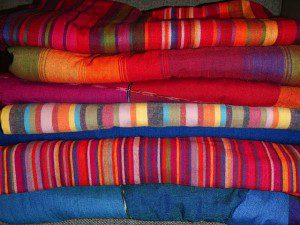 such as Debra’s 2-day Advanced Birth Support for Doulas and Midwives Workshop held here this weekend with Debra and Thea. Thea van Tuyl shared with us her beautiful Guatemalan Rebozos and many techniques to provide comfort in labor from her book – The Rebozo Technique Unfolded. A weekend like this is more than learning skills and getting information. For example, when we practice on one another how to use the rebozo we get just the same things we want to give to our clients- trust, a deep contact, healing, relaxation.”
such as Debra’s 2-day Advanced Birth Support for Doulas and Midwives Workshop held here this weekend with Debra and Thea. Thea van Tuyl shared with us her beautiful Guatemalan Rebozos and many techniques to provide comfort in labor from her book – The Rebozo Technique Unfolded. A weekend like this is more than learning skills and getting information. For example, when we practice on one another how to use the rebozo we get just the same things we want to give to our clients- trust, a deep contact, healing, relaxation.”
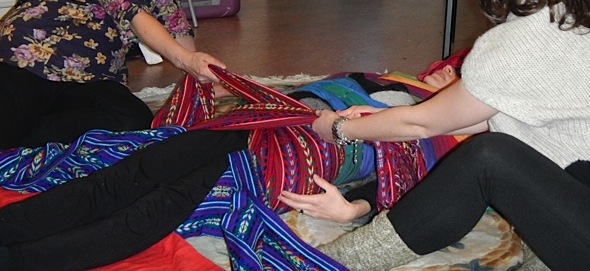
Debra loves to weave in exercise of listening, non-verbal communication and if appropriate touch, hugs and caring embraces to her workshops. Debra writes, “During labor there are many hours that we are together in silence, where no words are needed. Yet our connection and support remains strong. On the last day, Sunday morning, I can feel it is time for our group to look into each other eyes and go deeper into what it is to unconditionally nurture each other and thus others on their journey from maidenhood to motherhood. Without words our eyes, body and touch says so much. Even more than normal words of greeting. We have gone deeper, letting another to connect with us and to answer back with our eyes that we are here for you. Just as we greet a newborn, welcoming them with our eyes, our touch, our hearts open wide and then words of acknowledgement. Tears flow, hearts open as we feel our connections, oxytocin sparkles in our brains and body as without words so much is said and expressed between us.
“All over the world when women gather to speak of birth, our life-challenges and successes pour into the conversation, tears of joy and of sadness flow easily. 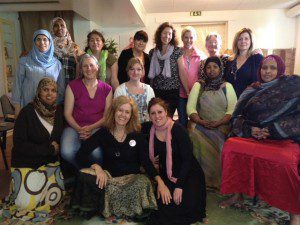 Our collective experience, wisdom and diversity is amazing. Our group represents four countries: Sweden, Netherlands, South Africa and the U.S.- sixteen women and one man. It is powerful to give another our unconditional love and acceptance. I ask each person to share his or her vision for birth with another. What can we each do to make a difference in how women, men and babies are cared for and greeted in our community, country or world?”
Our collective experience, wisdom and diversity is amazing. Our group represents four countries: Sweden, Netherlands, South Africa and the U.S.- sixteen women and one man. It is powerful to give another our unconditional love and acceptance. I ask each person to share his or her vision for birth with another. What can we each do to make a difference in how women, men and babies are cared for and greeted in our community, country or world?”
Please share with us what you hope to bring to the birth community in your future. Födelsehuset has plans to participate in the Human Rights in Childbirth Conference and Exhibition in Stockholm in the end of the year and Debra looks forward to sharing more workshops with Bodil and other birth workers in Sweden later this year, as well as other workshops around the world.
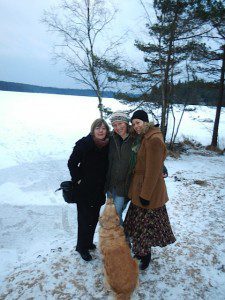 Thank you to Bodil Frey for sharing with us about birth in Sweden. Bodil is the chair of the association Födelsehuset, and a Doula and Childbirth educator. She is also the leader of the immigrant doula project. She can be contacted at: bodil.frey [AT] enbrastart.se.
Thank you to Bodil Frey for sharing with us about birth in Sweden. Bodil is the chair of the association Födelsehuset, and a Doula and Childbirth educator. She is also the leader of the immigrant doula project. She can be contacted at: bodil.frey [AT] enbrastart.se.
To read more about the Immigrant Doula Project visit: http://fodelsehuset.se/doulakulturtolk and at the bottom-left of the page you can download two articles in English about the organization including: “Midwives’ experiences of doula support for immigrant women in Sweden” and “Foreign-Born Women’s Experiences of Community-Based Doulas in Sweden.”
My daughter is very alternative and is thinking about a home birth with her husband. She is 40 minutes from Karlskrona and Kalmar. Do you have anyone for her to contact there? She is a Harvard Grad and is fluent in German, Swedish and a few other languages. She has a degree in Biology. She is due Nov 27. She is 26.
I would appreciate some local sources for her.
Thanks!
Her anxious mom,